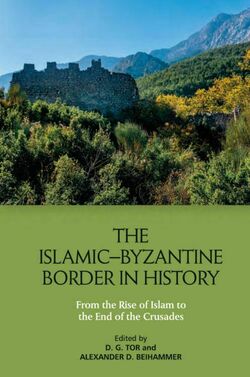New Faculty Book: The Islamic–Byzantine Border in History: From the Rise of Islam to the End of the Crusades

The Islamic-Byzantine Border in History: From the Rise of Islam to the End of the Crusades explores the significance of the Islamic-Byzantine border from the rise of Islam to the end of the Crusades. The book represents the first work dedicated entirely to the Islamic-Byzantine Border, provides a comparative perspective, featuring both leading Byzantinists and leading researchers of the Islamic world, and offers a uniquely broad chronological perspective, showing the longue durée rather than focusing on a specific period.
One of the most formative areas and periods of historical inquiry, across the fields of Mediterranean history, Byzantine history, Islamic history and the history of Muslim-Christian relations, is the long warfare between the Islamic and Christian worlds in the period that began with the Islamic conquests of the formerly Byzantine lands of the Eastern Mediterranean in the 630s CE and ended with the closing of the Crusades in the Levant c.1300 CE.
This cross-disciplinary book offers a broad spectrum of essays on important aspects of the political, social, religious and historical importance of the Islamic-Byzantine border between 630-c.1300CE, and in particular on the manifold ways in which the Islamic-Byzantine border affected the internal development and culture of each of the two civilisations. The chapters are written by twelve of the leading scholars in the field, including experts on both the Byzantine Empire and the Islamic world, and explore developments ranging from anti-government riots and dynastic revolutions to the border’s influence on religious law, apocalyptic literature, population policy and heroic culture.

Dr. Deborah G. Tor is Associate Professor of History at Notre Dame. She specializes in the political, social, religious, and military history of the medieval Middle East and Central Asia, from the rise of Islam until the 13th century. Her publications include the books Violent Order: Religious Warfare, Chivalry, and the ʿAyyār Phenomenon in the Medieval Islamic World (2007), which traced the privatization of Jihad in the 8th century and the rise of independent militias in the central Islamic lands until the eleventh century, demonstrating the importance of these groups in both the disintegration of the Caliphate and the formation of Islamic chivalry; The ʿAbbasid and Carolingian Empires: Studies in Civilizational Formation (2017); together with A.C.S. Peacock, Medieval Central Asia and the Persianate World: Iranian Tradition and Islamic Civilisation (2015), which explores the period of the autonomous Persianate dynasties (c. 850-1220); and, together with Minoru Inaba, The History and Culture of Iran and Central Asia: From the Pre-Islamic to the Islamic Period (in press), which traces some of the major cultural continuities and disruptions in the transition from the pre-Islamic to the Islamic period in the larger Iranian cultural world of the first millennium AD.

Dr. Alexander D. Beihammer is Heiden Family College Professor of History at Notre Dame. His research interests focus on Byzantine diplomatics, diplomacy, and cross-cultural exchange between Byzantium and the Muslim world, Byzantine-Turkish contacts in Asia Minor, and Byzantine-Latin relations in the Eastern Mediterranean. His earlier monographs deal with Byzantine letters and official documents in Arabic sources (2000), as well as Greek documents issued in the crusader kingdom of Cyprus (2007). His latest book Byzantium and the Emergence of Muslim-Turkish Anatolia, ca. 1040-1130, Birmingham Byzantine and Ottoman Studies (London and New York: Routledge, 2017) re-examines the earliest stage of the so-called Seljuk conquest and the beginning of the Turkification and Islamization of Anatolia. In addition, he collaborated in a project of the Bavarian Academy of Sciences on Byzantine imperial charters (2003) and published articles and co-edited collective volumes on diplomatics and ceremonies in the Eastern Mediterranean, the Seljuks and Turkish beyliks of Anatolia, as well as political relations, mutual perception, and communication between Byzantium, Islam, and the Latin East. His latest project deals with the political and socio-economic transformation of Western Asia Minor from Byzantine to early Ottoman times (13th–15th centuries) with a special emphasis on the Gulf of Smyrna region.
The Islamic–Byzantine Border in History is available from Edinburgh University Press.